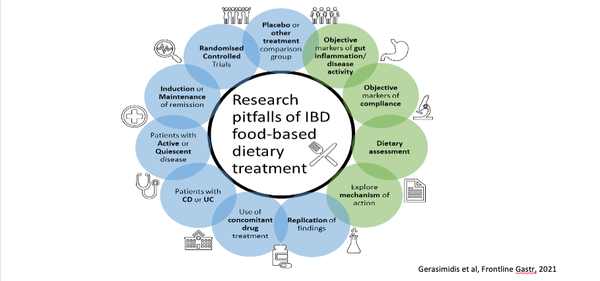PIBD Symposium 2022 Nutritional Highlights
The 6th International Symposium on Peadiatric Inflammatory Bowel Disease (PIBD) was held on September 7-10, 2022, in Edinburgh, Scotland. Highlights of several featured presentations regarding nutrition and diet are included below.

PIBD is hosted by the "Paediatric IBD Porto Group"—a group of Paediatric IBD experts from the European Society for Paediatric Gastroenterology Hepatology and Nutrition (ESPGHAN) who aim to "generate collaborative international research and to provide a leadership role with regards to the current diagnosis and management of IBD in children"
Presentations
Exposome
Presenter: Professor Charlie W. Lees, PhD FRCP (Ed), consultant gastroenterologist at the Western General Hospital, Edinburgh, and professor of gastroenterology at the University of Edinburgh
Dr. Lees gave an overview of the Exposome, or environment, and IBD. As part of this macro view, he does a "deep dive" into recent diet research and discusses the PREdiCCt Study, an effort to understand how the environment, diet, and genetics can be used to predict IBD flares. His full talk may be seen on video: The Environment and Inflammatory Bowel Disease
Video Presentation PIBD2022 -Exposome
Presenter: Professor Charlie W. Lees, PhD FRCP
Translating nutritional epidemiology and basic science to dietary therapy in IBD
Presenter: Konstantinos Gerasimidis, Professor of Clinical Nutrition, University of Glasgow
Professor Gerasimidis takes a critical look at recent IBD diet literature including: the inconsistency of epidemiological surveys; how recent animal studies showing the harmfulness of food additives need to be replicated in humans before used for recommendations; and how the positive impact of EEN on the microbiome should be further investigated—including how to replicate its effects by food or other avenues. He advocates for more research before making IBD dietary recommendations which differ from dietary recommendations for the general population.
How the epidemiology of IBD points to diet and what does this mean for prevention and therapy?

Presenter: Rotem Sigall-Boneh, RD. Clinical Dietitian & Researcher at Wolfson Medical Center (Israel) & founder of the Dietitian Committee of the European Crohn's and Colitis Organisation (ECCO)
Ms. Sigall-Boneh begins by reviewing IBD epidemiological studies including how industrialization and westernized diet patterns are associated with increased incidence of IBD; the potential impacts of ultra-processed foods (negative) and the Mediterranean diet (positive); and how diets with high inflammatory potential may be related to greater incidence of Crohn's disease. After pointing out the limitations of these studies, she reviews ongoing dietary interventions for IBD Prevention: the PIONIR Trial (Preventing IBD ONsetin Individuals at Risk) as well as the MELODY Trial (Modulating Early Life Microbiome Through Dietary Intervention in Crohn's Disease). Regarding IBD Treatment, she points to EEN and dietary therapy as improving remission rates. In synthesizing this research, Ms. Sigall-Boneh concludes by advocating for further intervention studies to personalize diets based on individual profiles.
Dietary Therapy: Progress in IBD

Presenter: Konstantinos Gerasimidis, Professor of Clinical Nutrition, University of Glasgow
Professor Gerasimidis summarizes some of the information from his earlier conference talk (Translating nutritional epidemiology and basic science to dietary therapy in IBD), takes an in-depth look at the high efficacy of EEN, gives an overview of IBD diet studies, and critically reviews recent studies for three diets: PEN & Crohn's Disease Exclusion Diet (CDED); the Specific Carbohydrate Diet (SCD), and Crohn's Disease TReatment with EATing (CD-TREAT). The talk emphasizes the quality of diet studies and potential research pitfalls.
Next Generation Nutritional Therapy in Active Crohn's Disease

Presenter: Konstantinos Gerasimidis, Professor of Clinical Nutrition, University of Glasgow
In this talk, Professor Gerasimidisreviews recent studies on PEN and EEN, including: the greater efficacy of combining PEN with biologics versus either treatment alone; the use of EEN when anti-TNF drugs lose effect; and the high percentage of strictures, fistulas, and abscesses being relieved via EEN.
Do's and Dont's of EEN —how to improve your success rate

Presenter: Rotem Sigall-Boneh, RD. Clinical Dietitian & Researcher at Wolfson Medical Center (Israel) & founder of the Dietitian Committee of the European Crohn's and Colitis Organisation (ECCO)
Ms. Sigall-Boneh reviews the treatment algorithm for using exclusive enteral nutrition (EEN) as a therapy for inducing remission in children with Crohn's disease. She emphasizes that although EEN is highly effective, one of the major obstacles is compliance and that a multidisciplinary team, with a dietician leading EEN administration, is critical for supporting the child and their caregivers.
Modified Exclusive Enteral Nutrition with the Crohn Disease Exclusion Diet is effective for Induction and Maintenance of Remission in children with Crohn Disease; the DIETOMICS-CD trial

Presenter: Rotem Sigall-Boneh, RD. Clinical Dietitian & Researcher at Wolfson Medical Center (Israel) & founder of the Dietitian Committee of the European Crohn's and Colitis Organisation (ECCO)
Ms. Sigall-Boneh describes a trial testing a 2-week course of EEN, followed by the Crohn Disease Exclusion Diet (CDED) + PEN. This protocol was tested against EEN alone, with the primary endpoint being corticosteroid-free remission at week 14 (as defined by Pediatric Crohn Disease Activity Index) and one of the secondary endpoints being a 50% reduction in fecal calprotectin at week 24. Study results will be available upon release of the pending publication.
Use of CDED in moderate to severe cases
Presenter: Rotem Sigall-Boneh, RD. Clinical Dietitian & Researcher at Wolfson Medical Center (Israel) & founder of the Dietitian Committee of the European Crohn's and Colitis Organisation (ECCO)
In this talk, Ms. Sigall-Boneh reviews the recent DIETOMICS-CD trial which helps answer the question: "Can the Crohn's Disease Exclusion Diet (CDED) be used for moderate to severe cases?" The take home points include: EEN and CDED are effective for remission induction in mild to moderate disease and the CDED may be considered in more severe disease, but "usually as a bridge to medical treatment." She also describes how a "short empiric trial" of dietary therapy will help identify whether a patient is dietary responsive. If they are responsive, these patients may consider adjusting their diet in addition to medication.




Support our Mission
Your donation will help us to enhance the well-being and health outcomes of patients with IBD.
Donate
